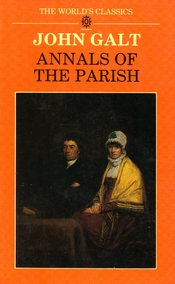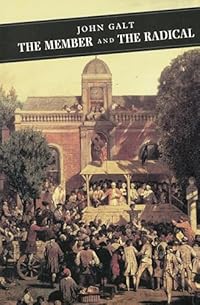Ringan Gilhaize by John Galt
Posted in Scottish Fiction, James Robertson, John Galt, History, Reading Reviewed, Scottish Literature at 12:00 on 25 March 2021
Or, The Covenanters.
Edited by Patricia J Wilson. Scottish Academic Press, 1984, 375 p (including 33p Notes on the Text and 10 p Glossary) plus xii p Introduction ii p Notes, ii p Acknowledgements and iii p Note on the Text. Originally published in 1823.

Compared to the lost cause of the Jacobites, endlessly retrodden by Scottish (and other) writers, the rise and defence of Calvinism in Scotland has been relatively neglected in the Scottish tradition. James Hogg’s The Brownie of Bodsbeck is an exception, as is Scott’s Old Mortality whose unsympathetic treatment of the Covenanting cause impelled Galt to write this riposte, and much more recently James Robertson gave us The Fanatic. The relevant events are seen through the eyes of the Gilhaize family but only in so far as any of its members were directly involved in them. The book is narrated by the titular Ringan Gilhaize and its first section tells of his grandfather’s activities during the Scottish Reformation, which in later life he endlessly recounted to the family round the fireside, and features his encounters with, among others, John Knox and James Stuart (the illegitimate half-brother of Mary Queen of Scots and whom on taking up the throne on her return from France she made Earl of Moray. A confirmed reformer, after Mary’s exile to England he became Regent of Scotland.) This time period was when the groundwork for the stern Calvinistic bent of Scottish Presbyterianism was laid and the text contains many examples of invective against prelacy, papistical idolaters and the Whore of Babylon.
The latter two sections deal with Ringan’s own life and times when, first Charles I, and later his son Charles II, tried to reintroduce elements of episcopacy into Scottish religious observance. This led in the former’s time to the signing of the National Covenant and a few years later the Solemn League and Covenant, which latter was essentially an anti-royal but certainly anti-Catholic agreement between Scottish Protestants and the English Parliament for Presbyterianiam to become the established religion south of the border. (These two Covenants are sometimes rolled into one in people’s minds but it was from them that the Covenanters – in that word’s pronunciation the emphasis is placed on the third syllable – gained their name.) The Covenanter’s insistence on the view that no king could interfere between a man’s conscience and God and that rebellion against any king who attempted to do so was justified, effectively made the Covenanters heirs to the Declaration of Arbroath and holders of the Scottish conscience.
The text of “Gilhaize’s” account is mainly in English larded with Scots words and forms of speech but has that wordiness that is characteristic of novels of its time and of course is reflecting the language of between two and three hundred years earlier than when Galt was writing. The dialogue, moreover, tends to be in very broad Scots indeed.
The novel is in part a history lesson since “Gilhaize” has to provide the background to the events he himself took part in. He therefore mentions the protests in St Giles Cathedral against the prayers in Charles I’s new Prayer Book as supposedly started by Janet (aka Jenny) Geddes (though her name does not appear in contemporary accounts,) a defiance of authority which led to open rebellion and the Wars of the Three Kingdoms. (For a long time these were known as the English Civil War despite the fact that they were precipitated by the necessity for Charles I to recall the English Parliament to provide money to suppress his Scottish religious rebels.)
After the Restoration of the Stuarts, fierce resentment resulted from Charles II’s apostasy in the matter of the Covenant which he had signed essentially in bad faith in what would now probably be called an act of real politique to bring the Scots Parliament onto his side in his war against Cromwell – a hopeless endeavour given the outcome of the Battle of Worcester. To the Covenanters signing was a sacred and binding act. Reneging on that could not be forgiven.
Galt’s focus on the affairs of one family allows him to illustrate the build up of both the petty and the major injustices of the anti-Covenanter legislation as well as Covenanters’ hatred of the favourite General of both the latter Stuart kings, James Graham of Claverhouse, whom the Covenanters dubbed “Bloody Clavers” for his enthusiastic prosecution of the sequestrations, fines, imprisonments and hangings which feed into the slow descent by Ringan into a haze of self-righteousness and moral zeal. A minor drawback of this is that most of the battles mentioned in the book take place off-stage since neither his grandfather nor Ringan himself were present at them. (Exceptions are Drumclog, Rullion Green in the Pentlands, and Killiecrankie, in all of which Ringan took part.)
The final vindication of the Covenanting resistance was the outcome of the “Glorious Revolution” of 1688 – here Galt has Gilhaize believe in the false propaganda that a man child was palmed off on the nation as the lawful son of James VII (and II,) known to Covenanters as “the Tyrant,” and his papistical wife – which secured the Protestant ascendancy in the form of William and Mary.
Two hundred year-old fiction is problematic for the modern reader at any time – patterns of language have changed, writers no longer need to pad out stories to reach a required word count, sentences tend to be less laboriously constructed – but the remoteness here is compounded by the dense nature of the history, the numbers of historical figures, the intensity of the religious discourse. Throughout, the book rings with Biblical imagery and allusions.
Though in their particulars its concerns have now passed into history in Scotland (except for their remnants being attached to a certain football rivalry) Ringan Gilhaize, as an examination of the mindset of the religious zealot, the firm believer in a higher calling, is salutary, and still has resonance for the present day. I’m glad I read it even if the prose does not always flow as smoothly as I might have wished.
Pedant’s corner:- In the Introduction; “worthy the attention” (worthy of the attention, or, worth the attention.) Otherwise: “the Earl of Angus’ house” (Angus’s,) St Giles’ kirkyard (St Giles’s,) her Highness’ presence (Highness’s.) “When she heard the voice or anyone talking in the street” (the voice of anyone talking,) juncutre (juncture,) a capital letter in the middle of a sentence (this may have been to signify a spoken phrase immediately after it; but that was followed by an opening quotation mark to signal the speech’s continuation,) thougt (thought.) In the Notes; divive (divine.)


